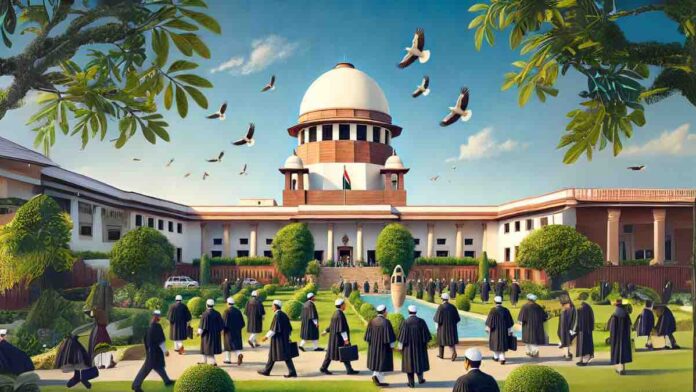Recently, the Supreme Court of India objected to a petitioner presenting arguments in Hindi, emphasizing that the official language of the court is English. The bench, comprising Justice Hrishikesh Roy and Justice SVN Bhatti, was hearing a special leave petition (SLP) against an order from the Allahabad High Court. The case involved a plea by the petitioner’s wife seeking the transfer of a dowry and cruelty case from Basti district to Prayagraj, which the High Court had approved.
During the hearing, as the petitioner began to present his arguments in Hindi, Justice Roy reminded him that the proceedings in the Supreme Court are conducted in English. Justice Roy stated, “This court conducts its proceedings in English. You presented personally, and we did not interrupt you to allow you to express yourself fully. There are two judges present. You cannot present arguments in Hindi without ensuring that the court understands you.” Subsequently, the petitioner agreed to present his arguments in English, and the proceedings resumed. Ultimately, the case was referred for mediation.
Under Article 348 of the Indian Constitution, all proceedings in the Supreme Court and the High Courts must be in English unless otherwise provided by Parliament. This provision allows the use of Hindi or other regional languages in High Court proceedings, but this requires prior consent from the President. However, this does not apply to the Supreme Court. According to Article 348, the official texts of laws and decisions should also be in English.
This is not the first time the language barrier has been an issue in the Supreme Court. In 2022, when a petitioner attempted to present arguments in Hindi, Justices KM Joseph and Hrishikesh Roy reminded him that the language of the Supreme Court is English. In that case, a lawyer was appointed to assist the petitioner to present his arguments in the appropriate language.
The Chief Justice of India, DY Chandrachud, recently advocated for conducting judicial education and proceedings in regional languages to make the justice system more accessible. He emphasized the possibility for lawyers to present cases in their preferred languages and suggested that local languages could play a significant role in improving the delivery of justice in the country. In January 2023, the Supreme Court initiated a plan to translate its decisions into regional languages, reflecting ongoing discussions about language use in India’s highest courts.




